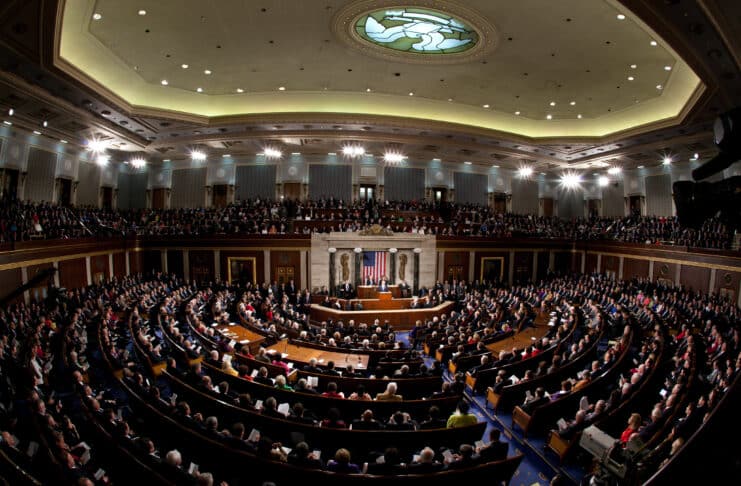Beating up on so-called “Big Tech” companies is a popular hobby among the nation's politicians. It fits neatly within the grievance-mongering and blame-shifting traditions of our major political parties.
A case study of such behavior comes from a recent Wall Street Journal op-ed from President Joe Biden. After the performative throat clearing about how bad tech is, especially for the children, Mr. Biden's ghostwriters offer a few broad policy solutions. This one was particularly jarring:
…we need serious federal protections for Americans' privacy. That means clear limits on how companies can collect, use and share highly personal data—your internet history, your personal communications, your location, and your health, genetic and biometric data. It's not enough for companies to disclose what data they're collecting. Much of that data shouldn't be collected in the first place. These protections should be even stronger for young people, who are especially vulnerable online. We should limit targeted advertising and ban it altogether for children.
Setting aside the recent failure of a federal data privacy law to make it out of the House, Mr. Biden's concern for data privacy, and that much of what is collected shouldn't be, ignores one of the biggest and most powerful data privacy offenders: government.
As the Brennan Center's Elizabeth Goitein wrote back in 2021, since 9/11, the surveillance state has mushroomed in size, power and intrusiveness. It's all in the name of safety, of course. But the cost to privacy and basic constitutional rights has been staggering:
After 9/11, the legal protections against suspicionless surveillance were swiftly and systematically cast aside. In a variety of contexts, it became lawful for the government to collect an American's sensitive information based merely on a claim that the information was “relevant” to a legitimate purpose, regardless of whether the person was reasonably suspected of wrongdoing. Even for the most sensitive of information, communications content, Congress gave the NSA free rein to collect phone calls, texts, and emails between foreign targets and Americans — communications that previously could not be obtained domestically without a court order based on probable cause.
The surveillance state went local, too, equipping and creating powerful incentives for local law enforcement to employ new and creative ways to get around the Fourth Amendment. According to the Electronic Frontier Foundation:
Whether it's sophisticated location tracking, ubiquitous video recording, or the instant analysis of our biometric data, law enforcement agencies are following closely behind their counterparts in the military and intelligence services in acquiring privacy-invasive technologies. Just as analog surveillance historically has been used as a tool for oppression, policymakers and the public must understand the threat posed by emerging technologies to successfully defend civil liberties and civil rights in the digital age.
In other words, the cops have linked hands with Big and Little Tech to spy on just about everything they can…without warrants.
This constitutionally offensive conduct got so bad a bipartisan group of Senators introduced the “Fourth Amendment Is Not For Sale Act” which sought to close many of the loopholes in federal law that allowed the government to buy data on the open market free of pesky concerns about privacy and the Fourth Amendment:
- Requires the government to get a court order to force data brokers to disclose data — the same kind of court order needed to compel data from tech and phone companies.
- Stops law enforcement and intelligence agencies buying data on people in the U.S. and about Americans abroad, if the data was obtained from a user's account or device, or via deception, hacking, violations of a contract, privacy policy, or terms of service. As such, this bill prevents the government buying data from Clearview.AI.
- Extends existing privacy laws to infrastructure firms that own data cables & cell towers.
- Closes loopholes that permit the intelligence community to buy or otherwise acquire metadata about Americans' international calls, texts and emails to family and friends abroad, and obtain records about their web browsing of foreign websites — information that would normally require a court order to compel.
- Takes away the Attorney General's authority to grant civil immunity to providers and other third parties for assistance with surveillance not required or permitted by statute. Providers retain immunity for surveillance assistance ordered by a court.
The bill went nowhere. Hardly a surprise, given the wide deference most politicians have traditionally given to security agencies and law enforcement.
But if Mr. Biden and others who have made a cottage industry out of Big Tech bashing are at all serious about privacy, they will not hesitate to make sure government is subject to the same restrictions. The Fourth Amendment was supposed to do this work for us. But the wider political class, including judges, have conveniently, and willfully, forgotten it.
The opinions expressed in this article are those of the author and do not necessarily reflect the positions of American Liberty News.
READ NEXT: Investigators Demand to Know if Hunter Biden Had Access to Unsecured Classified Documents >>



They Ignore ALL for the money
wonder about post Twitter with Musk in charge